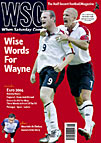 Another tournament, another predictable failure. Phil Ball looks at what went wrong for the Spanish this time and wonders whether they will ever find a winning formula
Another tournament, another predictable failure. Phil Ball looks at what went wrong for the Spanish this time and wonders whether they will ever find a winning formula
Spain rest in peace, in memoriam. ¡Lo de siempre! (The same as always!) screamed the sports tabloid Marca after the defeat to Portugal condemned them to another early exit. The squad usually packs its bags after the quarter-finals of a major tournament and, being slightly less accustomed to such early exits, the press – reasonably tolerant towards the affable Iñaki Saez for the preparatory weeks – finally showed their true feelings towards the manager the day after the defeat. Spain’s national paranoia traditionally centres on its team’s nervous collapse when the going gets tougher, so no one had really expected them to fail at the first hurdle, particularly in such a comfortable-looking group.
But there you have it. As subsequent events went on to show, it was far from a comfortable group, and the differences between Spain and the two sides that went through (Greece and Portugal) clearly resided in the twin facets of organisation and clarity of ideas. Spain, as ever, had a tasty-looking squad on paper, but their inability to make it count has now taken on the quality of a self-parody, of a self-fulfilling prophecy. As the players sat around moodily in Madrid’s airport the day after the Portugal defeat, Vicente, Valencia’s excellent winger, replied to a journalist’s “What went wrong?” question with the answer: “We’re Spain. What do you expect?” Such defeatism, whether intentionally ironic or not, was a depressing epilogue to the squad’s latest quixotic adventure.
Saez had never really managed at the top level and, in the cut and thrust of real competition, it showed. He took two teams to the finals – one which was based on the defensive and ball-winning solidity of the league champions, Valencia, and another that was more imaginative and “creative”, based around the precocious organisational skills of Xabi Alonso and the link play of Juan Carlos Valerón. The problem was that Saez seemed temperamentally incapable of supplanting his naturally cautious instincts by fielding these two players together, relegating Valerón to a couple of cameo appearances and exacerbating the team’s identity crisis by refusing to drop the woeful Raúl, a pale shadow of himself all season. Hence for all three games there was a lack of belief in the final third of the pitch, specifically demonstrated in the Portugal game and supported in general by the statistics for the opening phase. Spain entertained but ultimately proved to be shot-shy. Regarding the quality of attempts on goal, only the Swiss, with an on-target percentage of 17.4, proved more desperate than the Spanish figure of 19 per cent.
In total, Raúl managed nine attempts at goal during the three games, none of which actually made the goalkeepers work. The much-trumpeted Fernando Torres, who tried equally hard, managed six attempts but with a similar percentage of accuracy. It summed the week up perfectly. Spain do not understand catenaccio or even its distant cousins. They cannot hope to win a tournament by scoring two goals in three games and resorting to containment. If the forward line fails, the team goes home.
As in the case of Beckham, Raúl was a captain in need of self-confidence. The problem was that the troops could not be expected to lift the commanding officer. His team-mates knew he was off his game and low on confidence. It was not their job to pick him up. They had other things to worry about. Raúl should never have even gone to Portugal, but such a bold decision was beyond the stubborn and timorous Saez. His avuncular, teddy-bear presence at the heart of Spain’s latest attempt to bury the failures of the past were in the end all he had to offer. The subsequent appointment of the much tougher 65-year-old Luis Aragonés hardly smacks of revolution either, although I don’t wish to sound ageist. It just seems a timorous decision. He’ll steady the ship, for sure, but he is a man crustily set in his ways, rather like his predecessor.
La Liga likes to advertise itself as the best in the world, but accusations that it is the foreigners who ultimately provide the real quality is something that only the national side can dispel. Their fleeting and insubstantial appearance in Portugal has failed to remove the idea that the home-grown stars are over-hyped and it has failed to kill off the lingering suspicion that when it comes to the crunch Spanish players display a mental fragility whose root causes no psychologist has ever managed to truly diagnose. Will their time ever come? It’s the million-euro question.
From WSC 210 August 2004. What was happening this month